(C4) Short-term exchange of pupils in Greece (Katerini)
Sunday, 8th March 2020
The mobility of the Basque students in Greece was done as it had been planned. We have to mention that neither the Ministries of Education in Greece and Basque country, Spain nor the National Agencies of the two countries had banned Erasmus mobilities at that time of the visit and schools were open in both countries. Neither of the countries had closed down schools. Though, due to the extremely urgent conditions because of the Coronavirus spread, the programme was modified so as to be adapted to the present situation.
Thus, first of all, the Basque students and their teachers, Ms. Gemma Gutiérrez Peñafiel, Ms. Iratxe Cuñado Egaña and Mr. Garikoitz Alvarez Goikoetxea, were greeted at the airport of Macedonia, in Thessaloniki, by the Greek teachers Ms. Anna Persidou and Ms. Maria Dampratzidou and a small delegation of students.
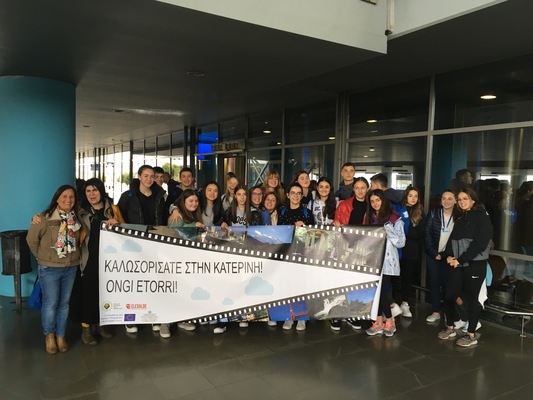
After an hour's drive we arrived at our final destination, Katerini. Even though the weather was moody, the mood seemed to be jolly despite the tiring trip.
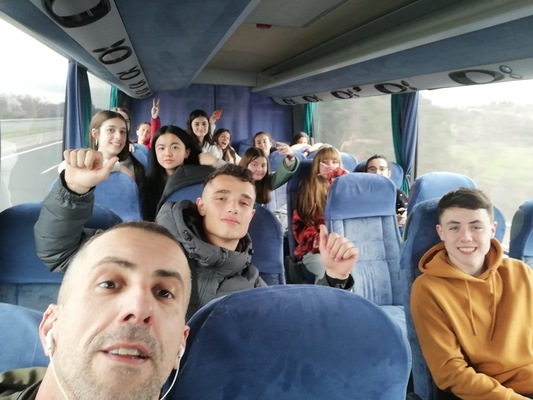
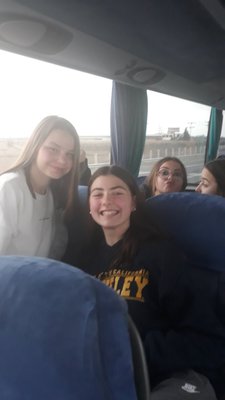
At the school area in Katerini the hosting families and the rest of the Greek students were waiting for their guests. An adventure is about to begin.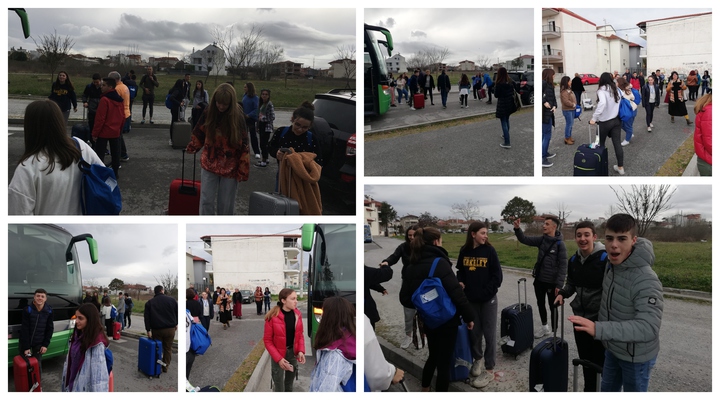
Monday, 9th March 2020
On the first day of our short-term exchange of pupils the Greek Erasmus team (both the students and some members of the pedagogical team) gave -despite the cold day- a warm welcome to the Basque students and their teachers, Ms. Gemma Gutiérrez Peñafiel, Ms. Iratxe Cuñado Egaña and Mr. Garikoitz Alvarez Goikoetxea.
The headmaster of the 3rd Junior High School of Katerini, Mr. Konstantinou welcomed the Basque delegation and thanked them for their help and contribution to the project.
Then the Basque coordinator, Ms. Gemma Gutiérrez Peñafiel, made a brief review of the project up to this point and thanked all the members for the work and effort they have put in it so far.
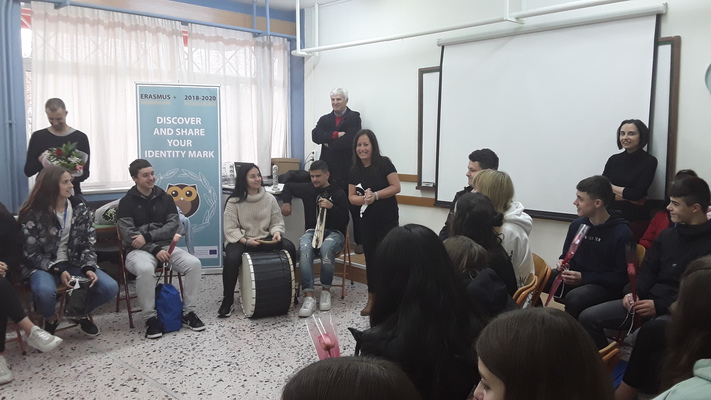
After presents were exchanged between the Basque and the Greek delegations, we started with the activities of the day.
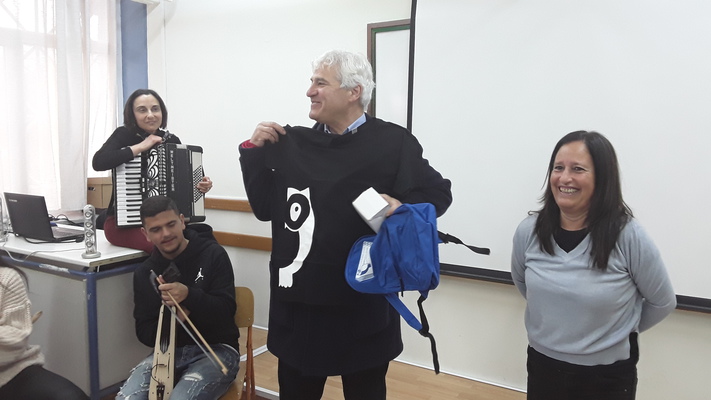
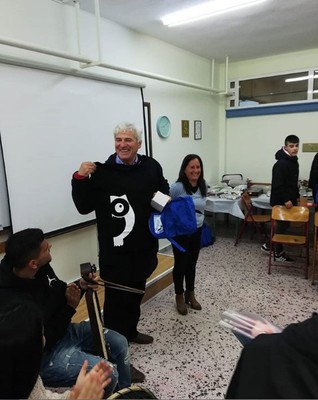
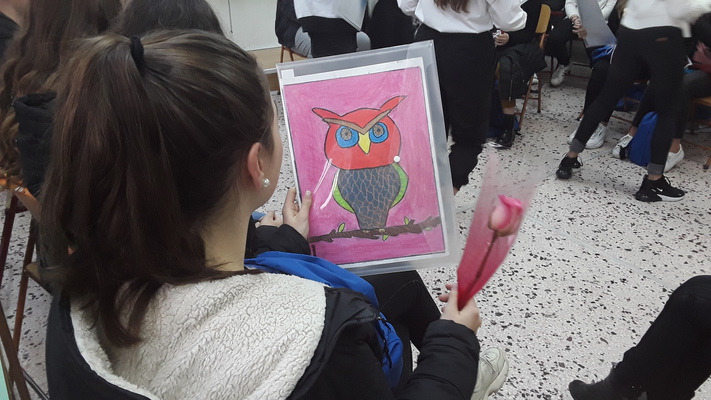
At the beginning of the event the Basque students together with their Greek hosts danced three of the dances practiced and learnt during the first year of the project. They danced with live music the Basque dance Zazpi jauzi, and then the Greek dances Hasapiko and Omal.
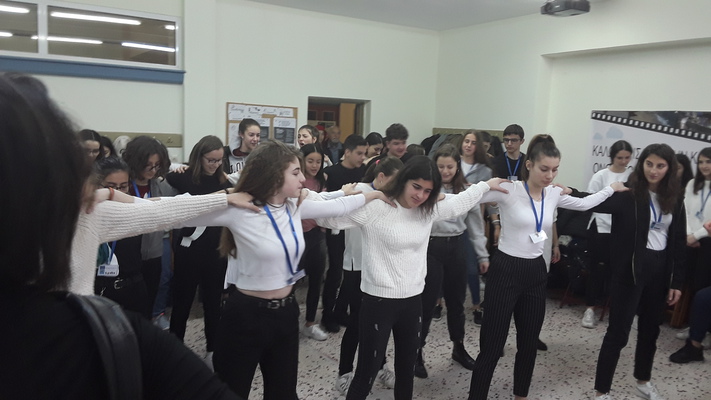
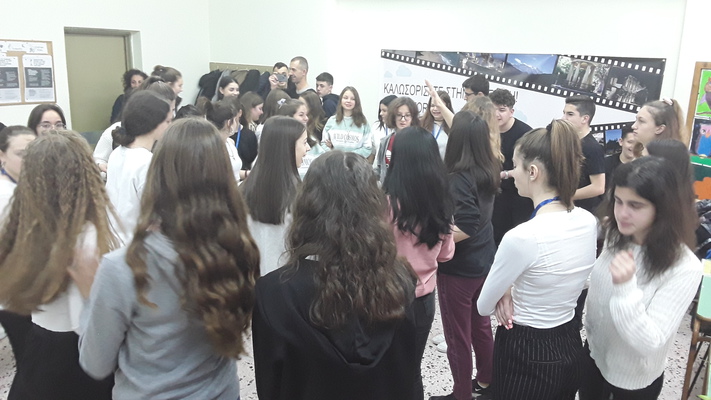
After the dances we needed to catch our breath, so we enjoyed a virtual tour around the area. We watched videos presenting first our school, then our town, Katerini, our mountain Olympus, the region of Pieria, the nearby city of Thessaloniki and finally the sights and attractions of Central Macedonia.
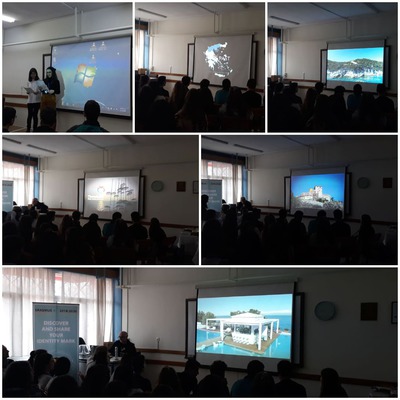
Two students, a Basque together with a Greek one, read a very moving text about the development of the project written in Greek.
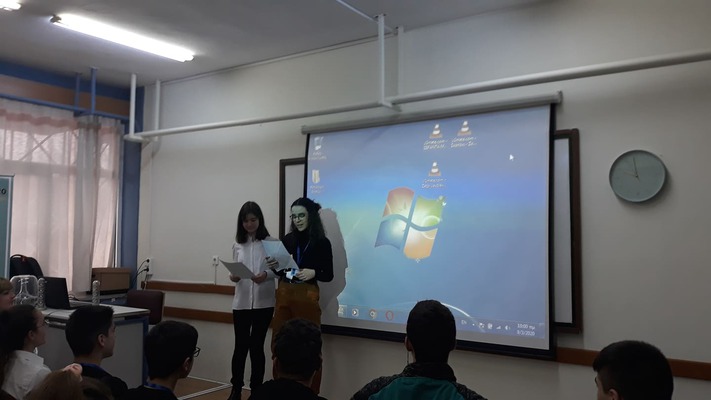
After that we took a break to enjoy the delicacies prepared by the Greek students and their parents.
Then we played a lot of amusing ice breaking games, so that we could meet and feel comfortable with each other, as it was only the very first day of the exchange. We played a ball game to help us remember each other's names, and other games to help us build trust and comfort among us. We had a really great time!
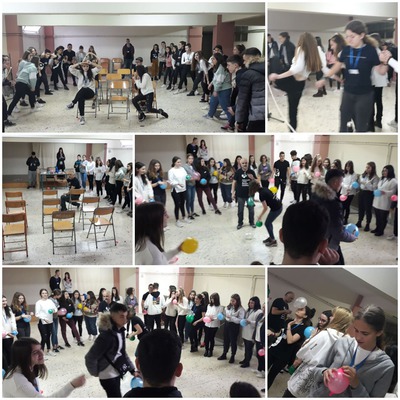
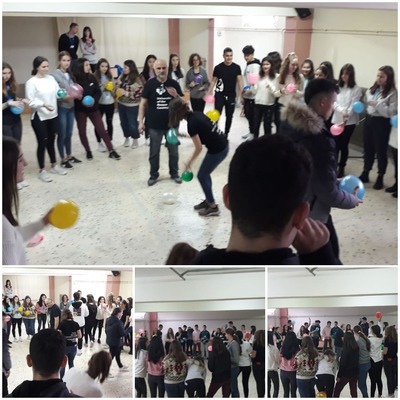
We ended the first day of our week with some drawing. We all drew in a very big poster our thoughts, feelings about the project and many more.
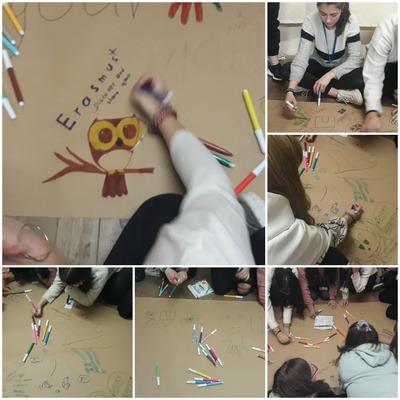
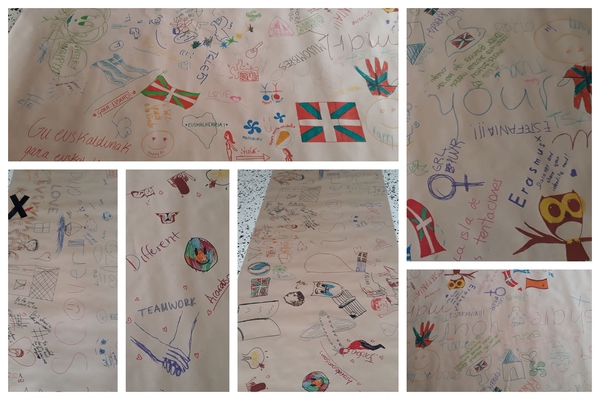
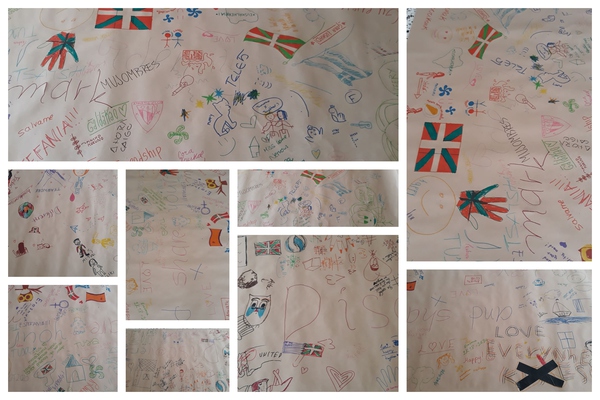
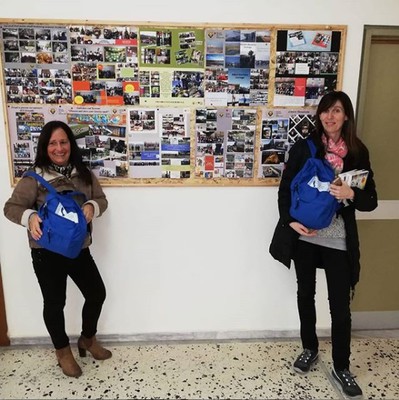
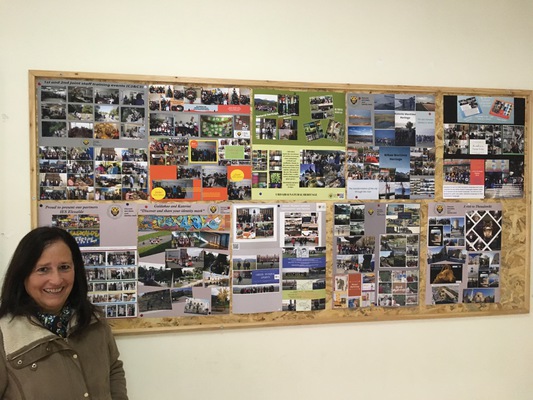
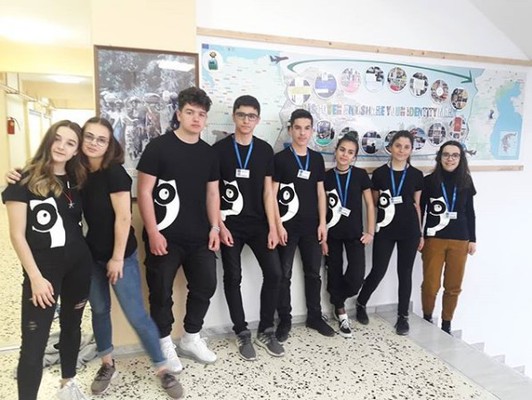
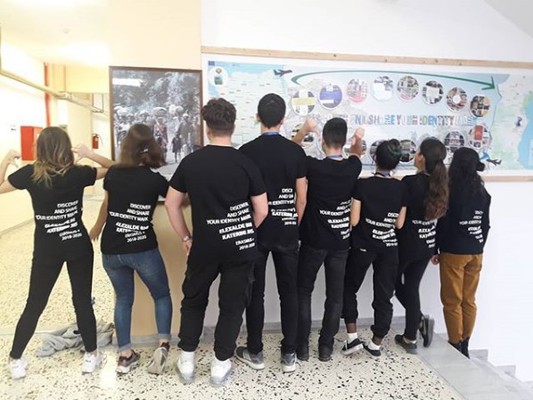
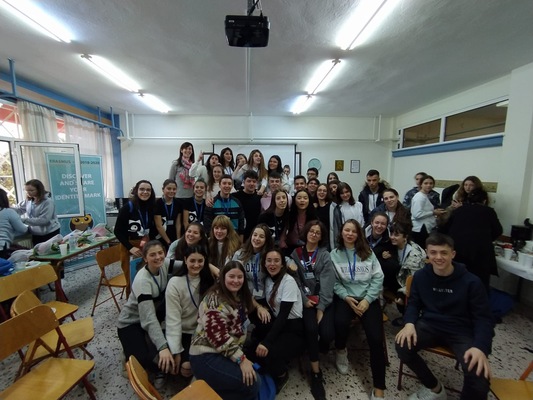
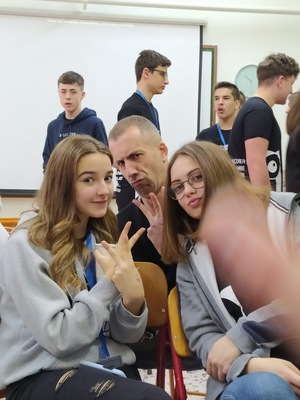
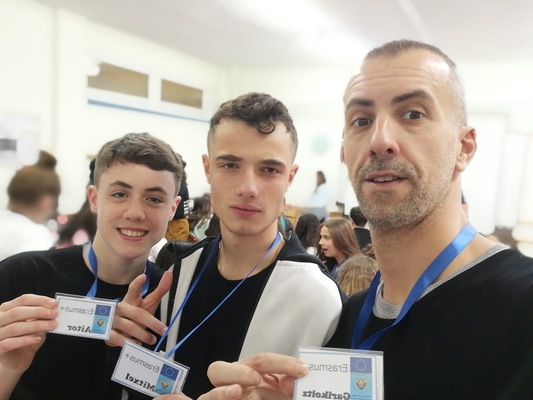
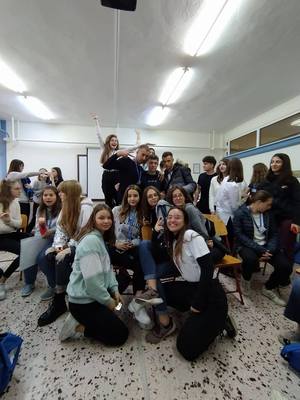
In the afternoon a small delegation of both teams appeared on a TV show in Dion TV Channel, that broadcasts in Northern Greece, to give an interview about the project "Discover and Share your Identity Mark". The Greek team had appeared in the same show last year, when we were asked to come again when our Basque partners would be here. Ms. Persidou and Ms. Gutiérrez together with the Greek and Basque students made a very good public impression taking about the project and their feelings about it.
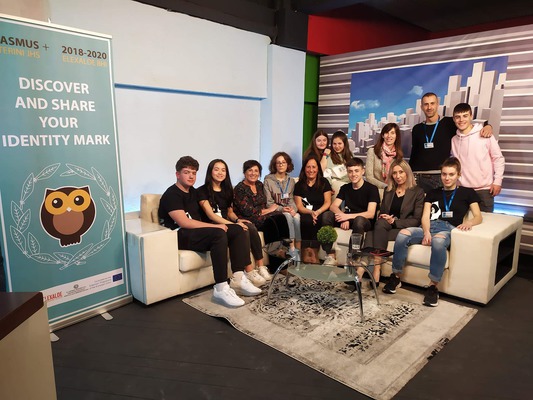
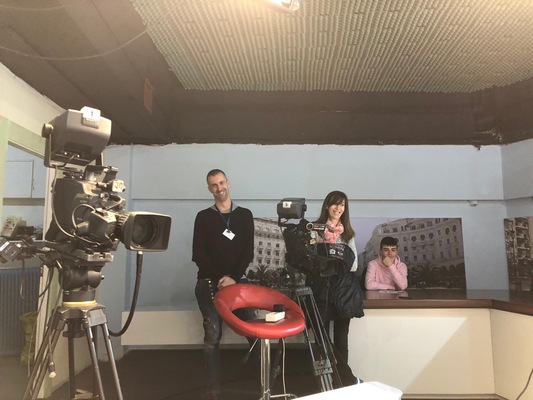
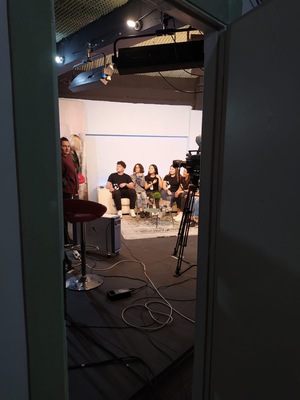
Note: Today's programme was modified to adjust to the measures against the Coronavirus spread as follows: The welcome ceremony at the Greek school was done by the students of the Greek Erasmus team and some teachers of the pedagogical team only in a classroom, isolated from the rest of the students and after that the students started the activities. We took good care so that they wouldn’t come into contact neither with the students nor with the teachers of the school for the safety of all. There were antibacterial tissues as well as antiseptic liquid for their hands everywhere. The students used separate toilets which were thoroughly sanitized.
Tuesday, 10th March 2020
The second day of the exchange began with a radio interview. Ms. Persidou from the Greek team and Ms. Gutiérrez from the Basque one together with two Basque students (Maria and Ane) and two Greek ones (Victoria and Dimitra) presented our project giving information about it and sharing their experience. They talked about Erasmus programmes, how the two partners started this collaboration, what gains they had from it, how such programmes help European citizenship and many more.
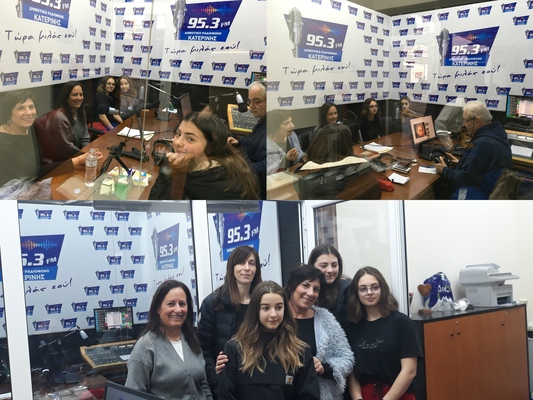
Straight after the interview we went to school where we took a lesson on Homer's Iliad by Mr. Kyrailidis and Ms. Goula. We were shown a very comprehensive video about facts and trivia concerning the Iliad (Homer's second most widely known poem) and then we concentrated on a very specific excerpt from it, the one where Homer describes and narrates at the same time the shield made by Hephaestus for Achilles.
Two students read the excerpt in both Greek and Spanish. The Greek student Chrysafis read the Spanish text, whereas the Basque student Mitxel read the Greek text.
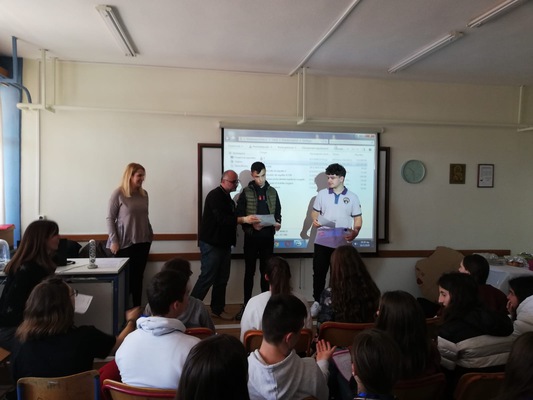
After the theoretical part of the lesson the students were given directions to create in groups replicas of the shield of Achilles for the Basque students to take with them back home.
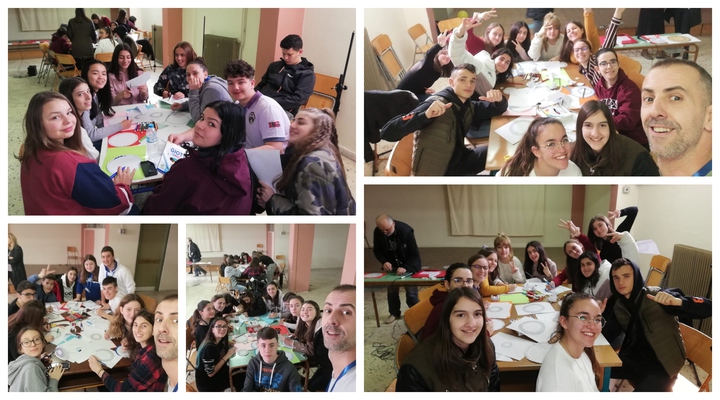
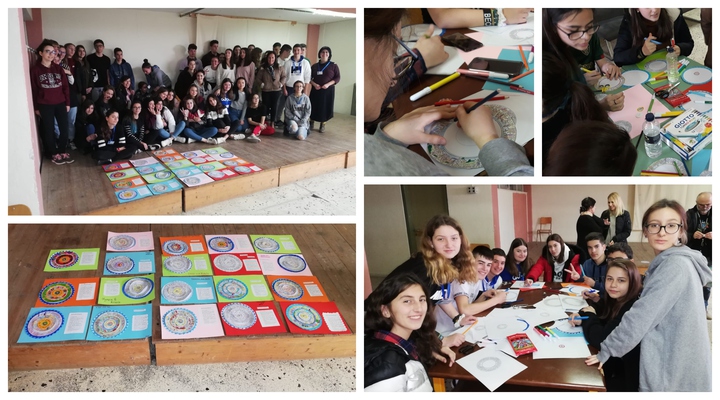
In the afternoon, right after school, we all went for a walk in the seaside village of Paralia where we enjoyed the sun and quiet of the season.
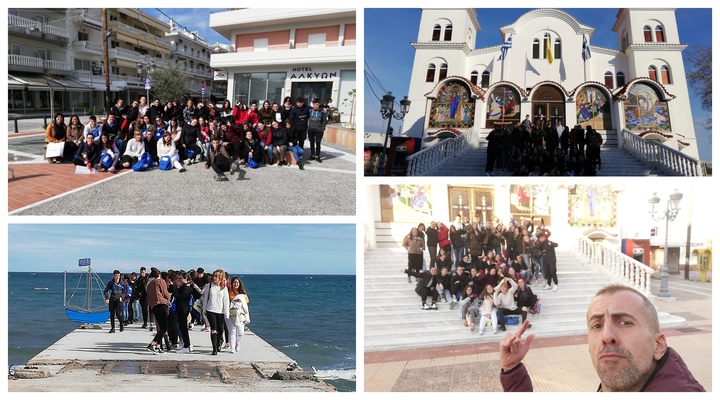
Note: We weren’t able to do the treasure hunt as we needed the school yard and this would bring the Erasmus team into contact with the other students.
Wednesday, 11th March 2020
On Wednesday morning we visited Aigai, the first city of Macedon and the first capital of the Macedon Kingdom. In the archaeological site of Aigai we entered the royal burial cluster, where we admired the tombs of Philip II (father of Alexander the Great), of Alexander IV (son of Alexander the Great) and finally of Meda (Philip's Thracian wife).
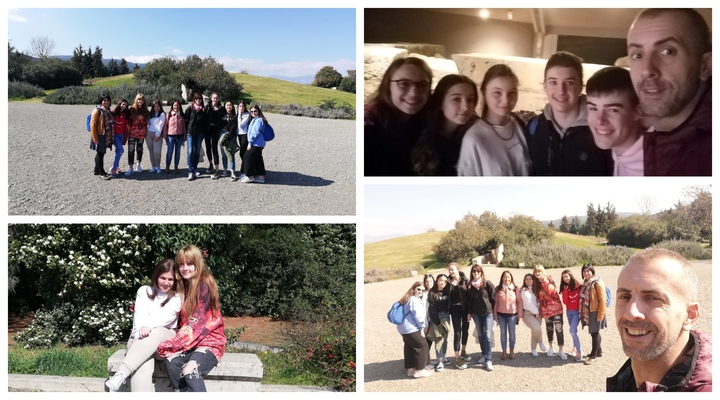
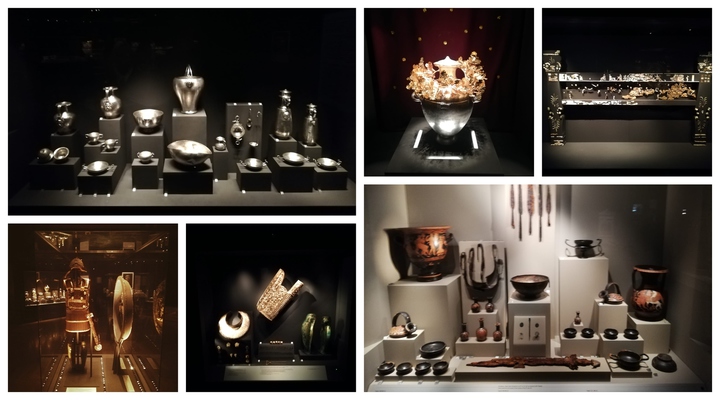
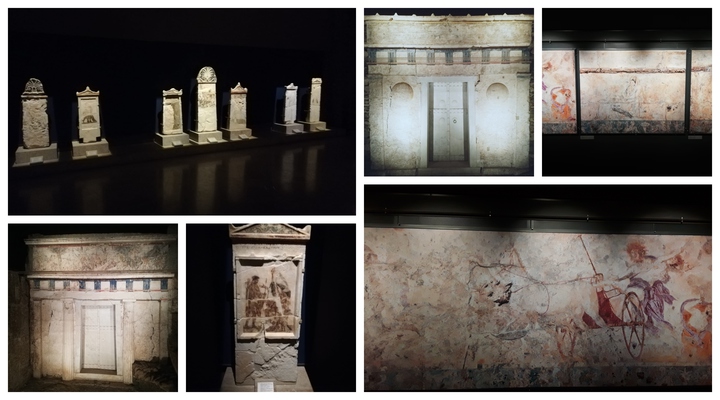
After Vegrina and the archaeological site of Aigai we moved on to Thessaloniki.
Thessaloniki is the second largest city of Greece and is proud to host several declared World Heritage Sites by UNESCO. So we visited some of them.
We first visited the Rotonda, one of the most important and imposing monuments of Thessaloniki with its architectural strength and its beautiful wall mosaics.
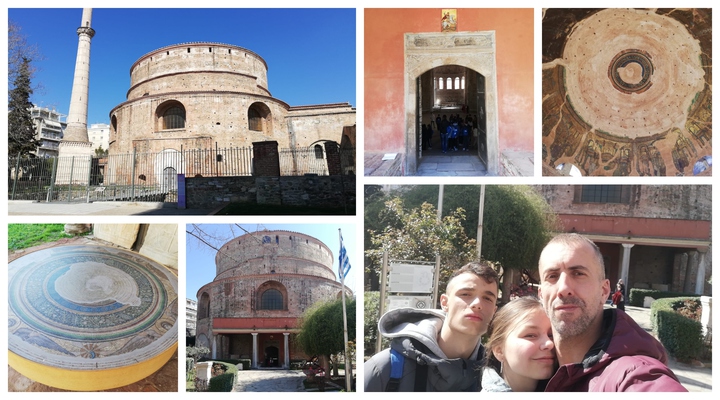
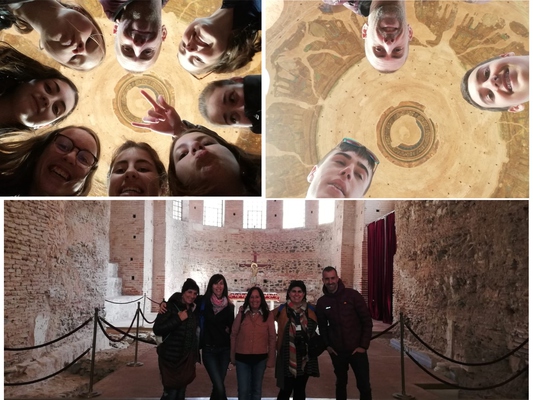
Then we walked down Navarinou St., where we saw the Galerious Arch and the Galerian Complex.
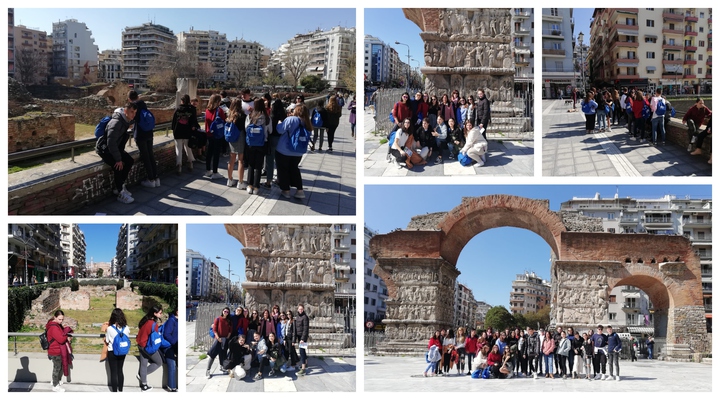
Finally we reached the White Tower, the emblem of Thessaloniki, which dominates the port area and was part of the city's fortification. We climbed to the top of the Tower and enjoyed the view of the city's port and waterfront.
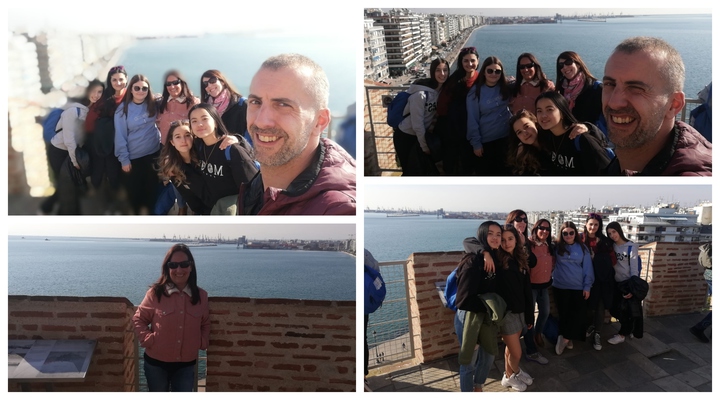
Before we took our way back to Katerini we stopped at the upper part of the city near the fortification, the castles, to enjoy the view and take some photos.
Note: As a safety precaution against the Coronavirus spread, we cancelled the visit to the archaeological museum in Thessaloniki so as to avoid contact with tourists in a closed-in place. We just visited all the open-air places of the programme as the Galerius Arch, the castle etc.
Thursday, 12th March 2020
We started our Thursday with a nice tour around the archaeological site of Dion, the holy city of the Macedonians. The Greek students were our guides in this tour. We saw the Hellenistic Theater of the era of Philip the E, the Sanctuary of Demeter, the sanctuary of the Egyptian goddess Isis, the mansion of God Dionysus with the lovely mosaic, the Sanctuary of Zeus, the shops and the baths. And in the Museum of Dion we saw the Hydraulis of Dion, the oldest musical instrument of that type, the predecessor of the modern church Organ.
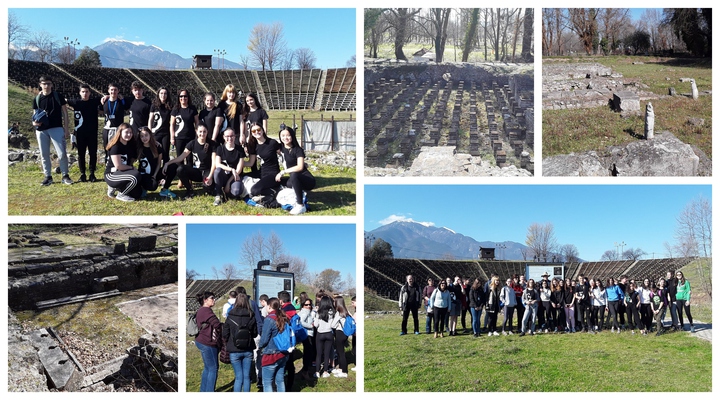
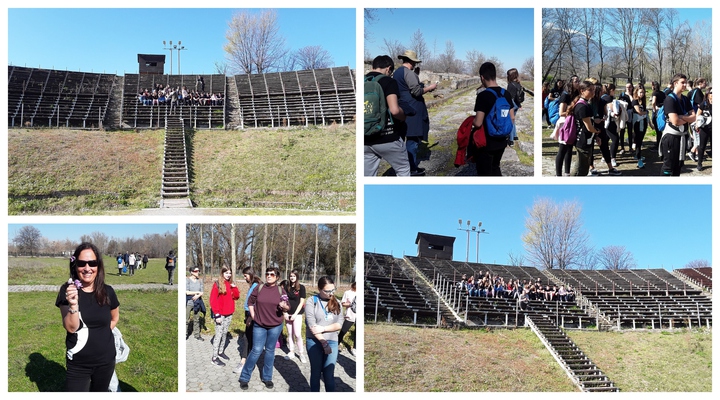
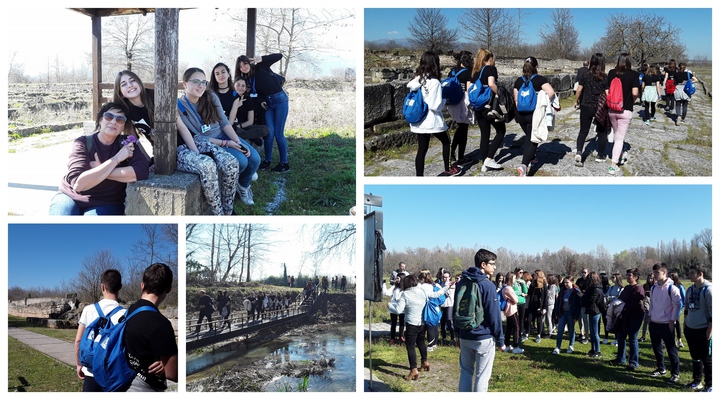
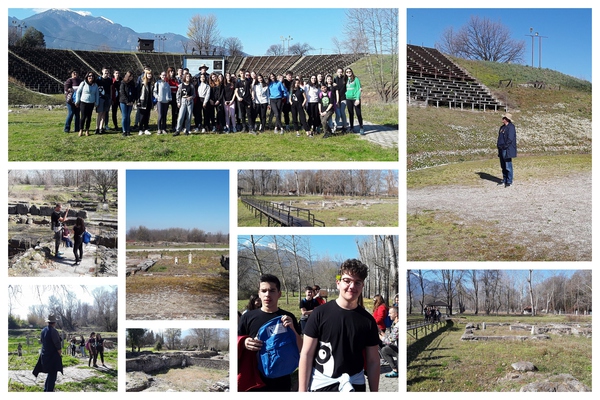 The Greek students guided us around the most important sights of the ancient city of Dion.
The Greek students guided us around the most important sights of the ancient city of Dion.
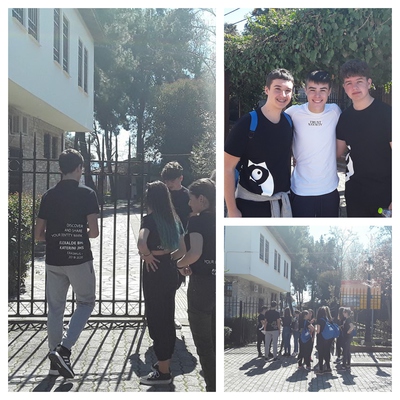
After Dion we headed to Litohoro, a small town at the foot of Mt. Olympus. So we hiked on a local path by Enipeas Gorge. We saw the beginning of the European long distance path E4, which crosses Olympus Mountain, and we admired the view of the summits of Olympus and the flora of the area.
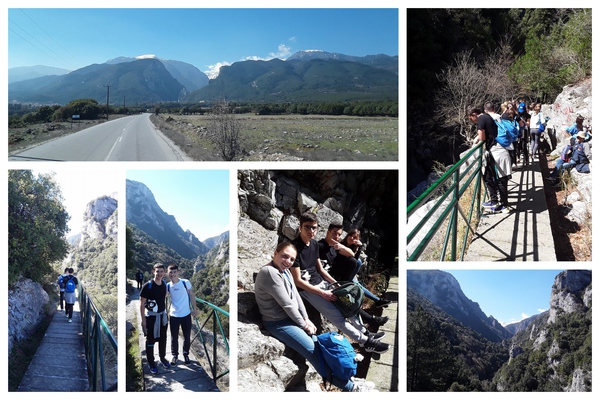
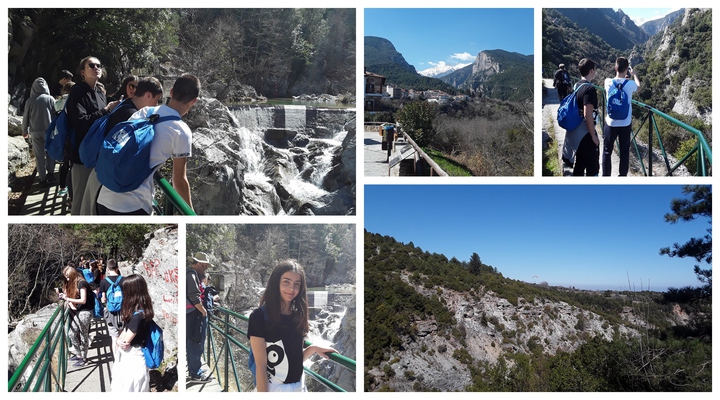 And after all this hiking it was time to eat. We had lunch altogether at a beautiful seaside taverna in the area of Gritsa. There we had the chance to cook ourselves, too. The Basque girls prepared a tortilla (a Spanish omelette) for us to try. We enjoyed the fish dishes prepared by the chef and his helpers (Greek and Basque students) and we had fun by the sea.
And after all this hiking it was time to eat. We had lunch altogether at a beautiful seaside taverna in the area of Gritsa. There we had the chance to cook ourselves, too. The Basque girls prepared a tortilla (a Spanish omelette) for us to try. We enjoyed the fish dishes prepared by the chef and his helpers (Greek and Basque students) and we had fun by the sea.
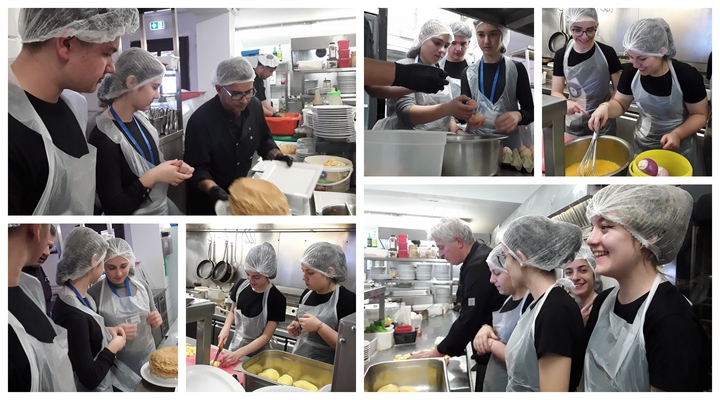
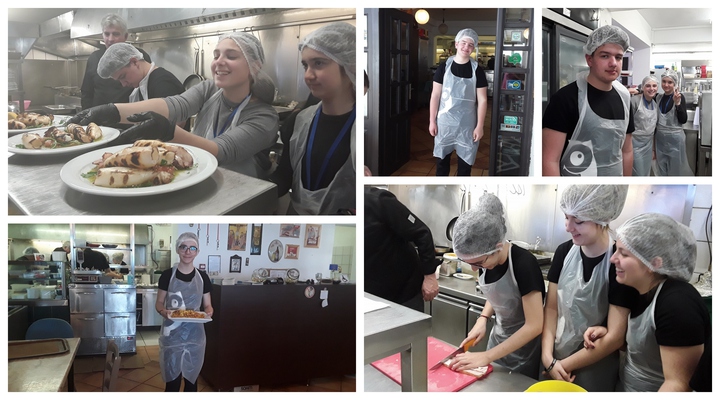
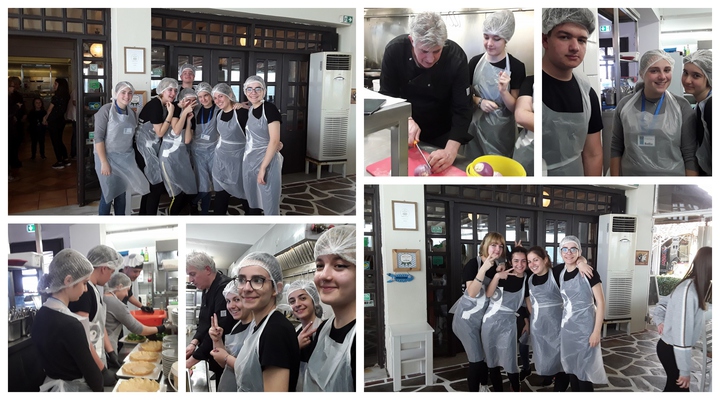
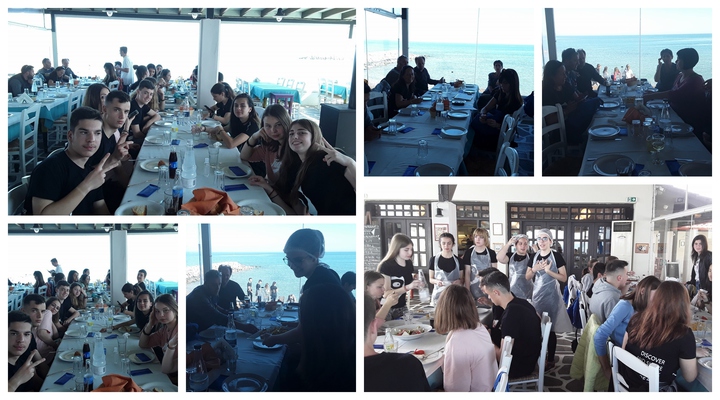 Note: The activities of the day were carried out according to the plan as they were in open-air places, which is Olympus Mountain, the archaeological site of Dion and cooking in a tavern which is by the sea and is safe. The only activity cancelled was the visit to the Information Centre of National Park of Olympus as it was held in a Hall.
Note: The activities of the day were carried out according to the plan as they were in open-air places, which is Olympus Mountain, the archaeological site of Dion and cooking in a tavern which is by the sea and is safe. The only activity cancelled was the visit to the Information Centre of National Park of Olympus as it was held in a Hall.
Friday, 13th March 2020
On Friday morning we visited the Platamon Castle, a castle of the middle Byzantine period located in strategic position in the southeast of Mount Olympus. We were guided around the castle and enjoyed the view from up there.
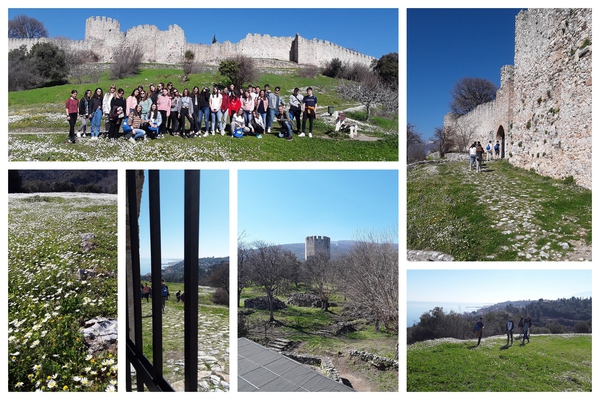
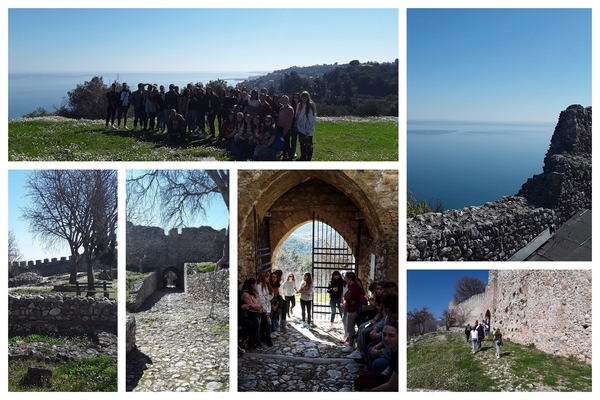
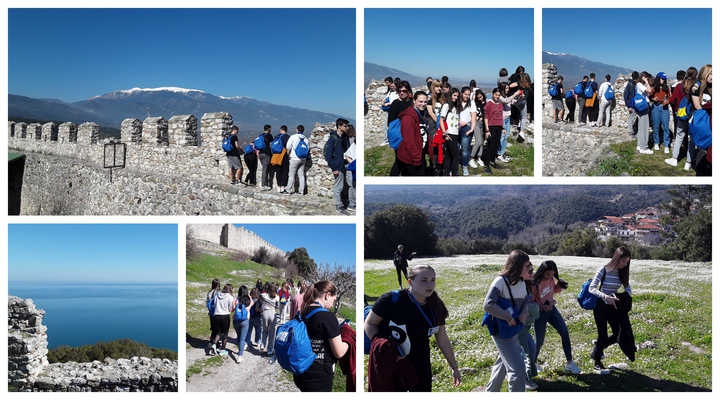 Afterwards we headed towards the traditional village of Old Panteleimon. There we had plenty of time to admire the local architecture of the stone houses and cobbled streets and at the same time relax and enjoy ourselves under the hot sun.
Afterwards we headed towards the traditional village of Old Panteleimon. There we had plenty of time to admire the local architecture of the stone houses and cobbled streets and at the same time relax and enjoy ourselves under the hot sun.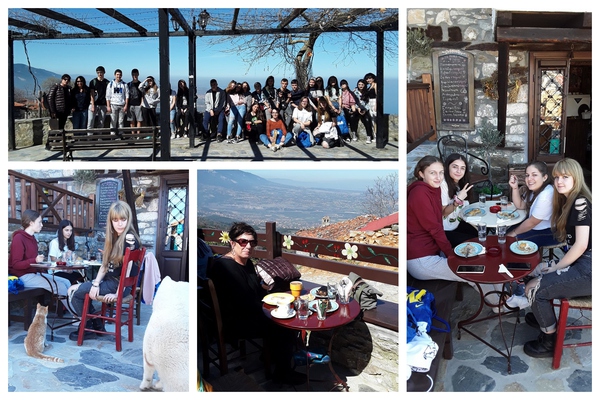
In the village of Old Panteleimon a nice lady who owns a shop was kind enough to talk to us about the architecture of the traditional settlement.
Note: The visit to the archaeological site of ancient Leivithra was cancelled as a precaution measure against the Coronavirus spread. So we just did the open-air visits to the castle of Platamon and the traditional village of Old Panteleimonas.
Saturday, 14th March 2020
At 3:30 am on Saturday we had to say farewell to our Basque friends. The Basque delegation had to leave one day earlier than originally planned (on the 14th March instead of the 15th) because of the gravity of the situation in their country due to the Coronavirus, thus the farewell party planned for Saturday the 14th was cancelled. However, we made a promise that we will see each other again soon.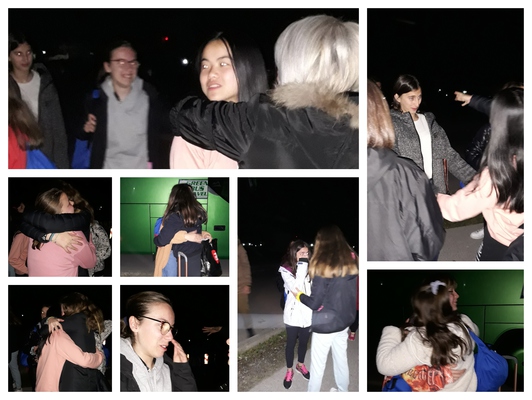
Note: In a nutshell, in this mobility we took all the necessary precautions so as to keep the children away from crowded places, as safe as possible, giving them instructions and advice on how to protect themselves. We also advised the host families to follow sanitary rules at home and keep an eye on what is happening around as well as keep us updated all the time.
Below you can find the letters of invitation, the programme of the mobility (although, as stated at the beginning, it was modified to be adapted to the constantly changing situations) as well as the final report of it.
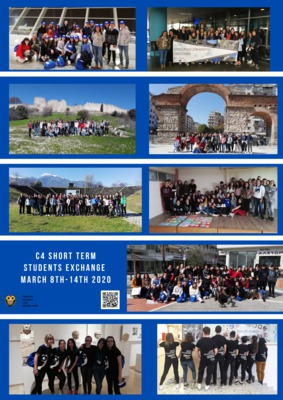
Students.pdf
Garikoitz.pdf
Gemma.pdf
Iratxe.pdf
Plan of the (C4) Short-term exchange of groups of pupils (Greece).pdf
Report (C4) Short-term exchange of groups of pupils (Greece).pdf